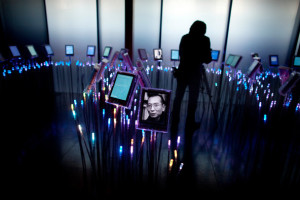 By CHRIS BUCKLEY MAY 20, 2015 3:00 PM May 20, 2015 3:00 pm 2 Comments
By CHRIS BUCKLEY MAY 20, 2015 3:00 PM May 20, 2015 3:00 pm 2 Comments
A portrait of the Chinese dissident-writer Liu Xiaobo at the Nobel Peace Center in Oslo. Mr. Liu was awarded the Nobel Peace Prize in 2010.Credit Espen Rasmussen for The New York Times
The works of the New York writer Paul Auster often hinge on ominous disappearances, and his novel “Sunset Park” has passages about the secretive detention of the Chinese dissident-writer Liu Xiaobo in 2008 and the efforts of the PEN American Center, a writers’ advocacy group, to secure his release.
Lately, Mr. Liu has vanished again from Mr. Auster’s fictional world.
In a twist that might well fit in one of Mr. Auster’s self-referential novels, a report released on Wednesday by the PEN American Center says that the section of “Sunset Park” about Mr. Liu’s arrest was cut without Mr. Auster’s approval in the Chinese translation of his book, another target of censorship that can strike literary works as well as explicitly political books.
“This is their new case, the most pressing case on the current agenda, and ever since Liu Xiaobo was detained in early December, they have worked on little else,” says a passage about PEN American’s efforts to free Mr. Liu in the English version of the novel, which was published in 2010. “He is being held in an undisclosed location, with no access to a lawyer, no writing materials, no way to communicate with anyone.”
In the novel, Alice Bergstrom, a graduate student working at PEN American, senses “that no amount of indignation will alter the plans of the Chinese authorities, and even if PEN can roust a million people to pound on drums across the entire globe, there is little chance those drums will be heard.”
The mainland Chinese edition of the novel, published late last year, left out the main parts about Mr. Liu’s case, and remaining mentions of Mr. Liu and China were replaced by cryptic, almost Auster-esque references to “L” and “country C.” In reality, Mr. Liu was sentenced to 11 years in prison in 2009 and was awarded the Nobel Peace Prize in 2010. His wife, Liu Xia, who is also mentioned in the original version of the novel, and appears in the Chinese edition as “L’s wife,” lives in heavy isolation under informal house arrest.
“Well, I live in the world I write about,” Mr. Auster, who has supported PEN American’s efforts to secure Mr. Liu’s freedom, said in a telephone interview.
“I’m not even blaming the publisher,” he said. “I understand the pressure they’re under, and if they had taken a stand and printed those pages, they probably would have been shut down.”
The New York Times confirmed the cuts by comparing the English-language and mainland Chinese editions of “Sunset Park.” According to the PEN American report, the Chinese company that oversaw the translation in China said that it had told Mr. Auster about the changes through a Chinese journalist based in New York. Mr. Auster denied that happened.
Hollywood has been grappling with how to avoid offending China’s censors while studios cultivate the country’s huge audiences for action spectaculars. And the pressures on foreign book publishers and agents are growing. Despite the inroads of Internet entertainment, the Chinese remain avid readers of books, including many in translation.
In 2013, Chinese publishers registered copyright contracts for 16,625 books from abroad, including 5,489 from the United States and 2,521 from Britain, according to government data. At BookExpo America, a major gathering of the publishing industry that opens in New York City on May 27, China will be the “guest of honor” at the Global Market Forum.
For detail please visit here
